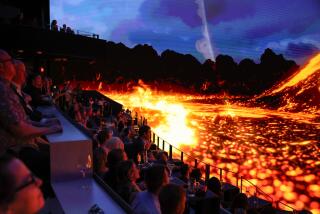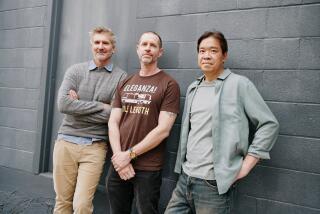Novel by Physicist Creates Big Bang
- Share via
The sky wasn’t even close to the limit when Gregory Benford, a UC Irvine physicist, plotted his newest work of science fiction. His new suspense novel--”Cosm”--delves into nothing less than the mystery of the origin of the universe.
As Benford puts it: “I like audacious ideas.”
“Cosm” is set in not-so-distant 2005. Alicia Butterworth, a brilliant young UC Irvine physicist, is at the Brookhaven National Laboratory on Long Island, N.Y., to conduct the first experiment in which uranium ions are shot through a collider at close to the speed of light. The goal: to produce conditions that resemble those during the first billionth of a second of the Big Bang.
But an explosion cuts Butterworth’s experiment short. The powerful release of energy caused by two colliding uranium nuclei tears a hole in the collider. Left behind is a mysterious piece of debris suspended in a magnetic field--an eerie, bowling-ball-sized sphere that fizzes with light.
Itching to study the shiny object--and unwilling to take a back seat on collecting the data--Butterworth smuggles the orb out of Brookhaven. It’s not until she’s got it back in her lab at UCI that she discovers what the strange sphere really is: a space-time wormhole into a newly created universe.
“Nobody’s ever written a book remotely like this,” Benford, 57, says of “Cosm” (Avon Eos). And forget that nonsense about wormholes on “Star Trek,” which Benford calls “technically moronic.”
Known for his lively intellect and keen interest in new ideas, Benford has never been one to be shy about expressing his views, particularly when it comes to what he scoffingly dismisses as “junk science.”
Although the existence of wormholes remains just a theory, no one’s likely to accuse Benford of depicting junk science in “Cosm.” A UCI faculty member since 1971, Benford conducts research in astrophysics and plasma physics, the study of gases made out of ionized atoms. He’s also served as an advisor to the Department of Energy, NASA and the White House Council on Space Policy.
So when Benford writes in “Cosm” that “the resulting high-energy densities could conjure up a spitting particle fog called the quark-gluon plasma,” readers can be assured he knows what he’s talking about.
That’s not to say “Cosm” reads like a dry lecture. Benford dishes up the requisite page-turning ingredients as Brookhaven battles for control of the sphere--including an unexpected surge of radiation that flash-fries a grad student, a kidnapping, a national media feeding frenzy and a chase by federal agents.
Benford, who lives in Laguna Beach with his wife, Joan, and their two children, uses “Cosm” to make some choice observations about Orange County. Comments a visiting Caltech physicist: “I like Orange County. . . . It’s like L.A. without caffeine.”
And there’s the restaurant near UCI that features menu items such as a “mellow, tempting blend of our hand-rolled angel hair pasta, smothering in a saffron-laced sauce of aged fromage, served on blue-white china with complete, authentic silverware.”
To which Butterworth observes: “Law of the universe. The longer the menu description, the worse the food.”
Benford also delves into university politics and has fun with students, one of whom writes in a final exam that “water is melted steam.” And there’s the exasperated student who complains after taking the test, “My calculator keeps making the same mistake.”
But at the heart of “Cosm” is Benford’s depiction of how scientists think and react to a scientific discovery of immense proportions. Publishers Weekly says this may be the most enthralling science-fictional portrayal of how actual science is done since Benford’s own Nebula Award-winning 1980 bestseller, “Timescape,” about a team of scientists that attempts to communicate back in time to prevent ecological disaster.
Steve White, a professor of physics and astronomy, is a colleague of Benford’s at UCI. He gives Benford high marks for his depiction of scientists at work--”the little things like the bizarre answers that you get on exams” and the division of time between teaching and research. “A lot of the physics professors in our department are not science-fiction fans,” White says. “I happen to be one who is.”
For some, Benford goes too far in his accurate depiction of scientists at work. While acknowledging that Benford’s extensive use of “authentic [scientific] jargon and cutting-edge physics” is “manna from heaven for scientists and hard-core sci-fi fans,” a review of “Cosm” in The Times said, “the rest of us are left scratching our heads.”
*
Benford sips the dregs of a Pepsi as he discusses “Cosm”--his 20th novel in 28 years--in his cluttered office. He has just returned from a promotional tour in the Midwest and will be leaving in a few days for a publicity swing up to the Northwest. A series of book signings in Los Angeles will wait until March when Benford returns from a monthlong research stint as a fellow at the Santa Fe Institute in New Mexico.
Benford, who devotes nights and weekends to his fiction, acknowledges he couldn’t pull off a novel like “Cosm” without his scientific background.
“When Joseph Wambaugh writes about the LAPD, you listen because you know he knows the scene,” he says. “Lots of people write cop novels, but they don’t have that authenticity. My feeling is that science is virtually an unexplored ground. It’s very visible--more so all the time--but there’s no fiction that tells us how scientists think, and they really don’t think the way that other people do.”
Benford says that “the media mostly want scientists to give them absolute, final results. But science doesn’t [work that way]. It gives you provisional results. Some journalists act betrayed if the result gets reversed sometimes. I mean, ‘You told us this,’ as though it’s some sort of certitude.”
Benford gave no thought to the gender or ethnicity of his main character until he came very close to writing the book. “I suddenly realized, why not make it someone who is already pretty much outside the ordinary in the society? A black woman in the university is a rarity, so why not make her special that way?”
In creating Alicia Butterworth, “I wanted to portray a character who is not an alabaster saint--or an ebony one--and has some clear personality problems and is a driven personality. Many people who make great discoveries are that way.”
Butterworth never really fits in, he says. “She has problems because she feels that way, and she’s highly irritable. Plainly, people are a little uneasy with her and it’s not clear whether they’re uneasy because of her inherent personality or because she’s black. That’s what it’s like in the real world.”
*
Benford says he first became intrigued with the idea of writing a novel about creating a universe in the laboratory in the late ‘80s when physicist Alan Guth and his collaborators at MIT had their first papers on the subject published in scientific literature.
Benford says it remains unknown whether it is physically possible to create the proper conditions in the lab. “It lies ultimately on the quantum theory of gravity, which doesn’t exist. What interests me is that we’re even capable of envisioning this. It may be that it will never happen, of course. But if it did it would imply some very strange things. I tease those out in the novel.”
Chief among those is the implication that “ordinary people” could create universes. “We have a name for people who create universes--they’re called gods,” he says. “There is no greater hubris than to think that we could take the place of godlike implications.
“At the very end of the book I then turn this into cosmological theory when [a Caltech theoretician] says to [Alicia Butterworth], ‘Well, what makes you think you’re the first? If this is doable, then maybe it’s been done many, many times before and we’re a product of it.”
Benford said he set “Cosm” in the year 2005 because that’s when experiments using uranium nuclei in the collider at Brookhaven National Laboratory are scheduled to begin. Benford said MIT’s Guth and his collaborators have worked out a calculation that shows there is a remote possibility that the collider will produce a wormhole using uranium nuclei.
Benford believes any danger involved in conducting the experiment is remote. And by not doing the experiment, “you remain forever ignorant.”
And what would it prove if a human were to succeed in creating a universe in a lab?
Benford shakes the ice at the bottom of his cup and grins:
“That we, puny though we are, can have enormous, even godlike, consequences.”






